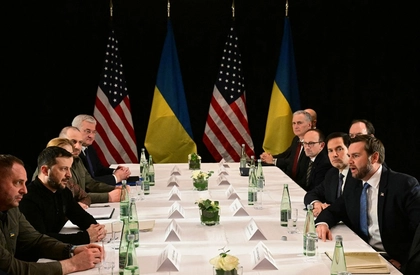How the strengthening of the right-wing camp in the EU Parliament will effect support for Ukraine is still unclear, as this is yet another issue on which the corresponding parties are divided. But Europe's commentators detect a trend.
Dramatic weakening of two main engines
JOIN US ON TELEGRAM
Follow our coverage of the war on the @Kyivpost_official.
The results do not bode well for Kyiv, The Spectator fears:
“The European election may seem a non-event, leaving the European Parliament and the future Commission in the hands of the same centrist pan-European coalition. ... But that conclusion is an instance of fallacy of composition. The seeming stability in the aggregate hides a lot of consequential political churn at the national level, not least a dramatic weakening of the two main engines of essentially all European policymaking: Berlin and Paris. Europeans, and Ukrainians in particular, might not like the coming consequences.”
Moscow delighted at the far right's success
The election outcome is a boon for Russian propaganda, Corriere della Sera comments:
“The pro-Ukrainian majority has for the most part held its ground, but the advance of the far right has triggered a state of euphoria in Russia. ... The first to raise his glass was Marat Bashirov, self-proclaimed prime minister of the Lugansk People's Republic. ... He sees the elections as proof that the people of Europe don't want to fight against Russia. The defeat of Macron and Scholz, according to [former Russian prime minister] Dmitry Medvedev, is 'a reflection of their inept policy of supporting the Ukrainian government'.”

Munich and After: An Unprincipled Mess
No alarmism, please!
The threat of dwindling support for Kyiv doesn't just come from the right, Berlingske notes:
“If the far right wants to cut aid to Ukraine, we must be on our guard while bearing in mind that populist pacifism also has a hold on the left. Just look at Olaf Scholz, who marketed himself as 'peace chancellor' during the election campaign. Conversely, not everyone on the right is on Putin's side - the Italian Giorgia Meloni in particular has emerged as a key supporter of Ukraine. So reactions to the EU parliamentary elections must not be purely alarmist. The EU summit must interpret the results correctly and also learn to listen to the populists.”
You can also highlight the text and press Ctrl + Enter











